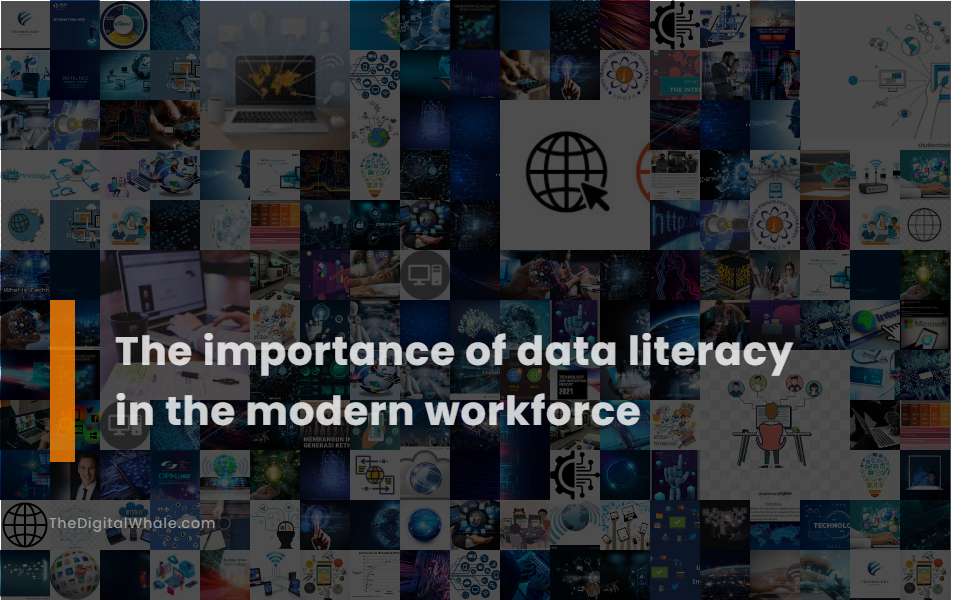The Importance of Data Literacy In the Modern Workforce
What is the importance of workforce data literacy in the modern workplace? What are the benefits of having data literacy in your workplace? Let's find out more about The Importance of Data Literacy In the Modern Workforce.

Informed Decision-Making: Enables individuals and organizations to make decisions based on evidence rather than intuition.
Data literacy is crucial for informed decision-making, enabling individuals and organizations to make decisions based on evidence and analysis rather than intuition, leading to more accurate and effective outcomes across various aspects of business and personal life. For more insightful details, the New Horizons blog explores the varied benefits of enhancing data literacy, emphasizing its significant impact on decision-making processes.
Increased Efficiency and Productivity: Helps employees identify patterns, trends, and anomalies to improve processes and reduce costs.
Data literacy increases efficiency and productivity by enabling employees to identify patterns, trends, and anomalies in data, which can lead to process improvements, cost reductions, and optimized operations such as streamlining workflows, removing bottlenecks, and eliminating waste. Organizations can benefit significantly by encouraging their workforce to hone data interpretation skills and become adept in data-driven decision-making, as detailed in the comprehensive article on New Horizons. Such initiatives can transform business models and harness the full potential of data for competitive advantage in today's digital landscape.
Innovation and Growth: Allows organizations to identify new opportunities and develop innovative products and services.
Data literacy is crucial for innovation and growth as it enables organizations to identify new opportunities, develop innovative products and services, and drive business growth by harnessing the power of data to understand market trends, customer behaviors, and operational efficiencies. Data literacy allows organizations to identify unique growth opportunities and develop new products and services with lower risk, supported by data-driven insights that foster innovation and creativity across the workforce. For more in-depth understanding, explore what Data Literacy entails and its significance in today's data-driven world. This capability not only enhances operational efficiencies but also cultivates a more resilient workforce poised to tackle future challenges.
Competitive Advantage: Positions businesses to compete and succeed by capitalizing on available data.
Data literacy provides a competitive advantage by enabling businesses to make informed, data-driven decisions, identify patterns and trends, and optimize processes, allowing them to stay ahead of the competition and drive business success. By cultivating data literacy within an organization, companies can effectively transform into Data-Driven Powerhouses, unlocking new opportunities and achieving sustainable growth in an increasingly data-centric world.
Risk Management: Helps organizations identify and address potential risks and vulnerabilities.
Data literacy is crucial in risk management as it enables organizations to use data to inform decisions, identify and mitigate potential risks, and create data-driven indicators to track and manage risk factors, thereby enhancing efficiency and reducing vulnerabilities. By fostering Data Literacy in the workplace, employees are empowered to proactively mitigate risks by ensuring compliance with regulations, reducing the likelihood of costly fines and reputational damage, and making more accurate forecasts to anticipate and manage potential risks. This comprehensive approach underscores the significance of integrating data literacy into the core strategies of risk management practices.
Related:
What are some steps to building a personal brand online? What is the three C's of building a personal brand in the digital age? Let's find out more about Building A Personal Brand In the Digital Age.
Compliance and Regulation: Ensures businesses can manage and understand their data to maintain compliance with regulations.
Data literacy is crucial for compliance and regulation as it enables organizations to manage and understand their data, ensuring adherence to data protection regulations, privacy laws, and industry standards, thereby reducing the risk of costly fines, legal liabilities, and reputational damage. For a deeper understanding of such benefits, you can explore more on the Data Literacy Benefits blog.
Employee Empowerment and Job Satisfaction: Enhances employee confidence, engagement, and retention by equipping them with data skills.
Data literacy empowers employees by enhancing their confidence, engagement, and retention. It enables them to understand and utilize data, communicate more effectively, and make meaningful contributions to their teams, leading to improved job satisfaction and reduced errors. Incorporating data literacy into the workplace allows employees to see how their data-driven insights contribute to the organization's success. This increases their sense of value and impact, aligning their work with performance metrics and incentives, ultimately boosting employee retention.
Enhanced Collaboration: Fosters a culture of data-driven decision-making, promoting cross-functional collaboration.
Data literacy enhances collaboration by enabling non-technical and technical employees to communicate more effectively, follow each other's work, and make meaningful contributions to projects, thereby reducing errors and speeding up project completion times. This fosters a culture of data-driven decision-making, promoting cross-functional collaboration and improving overall efficiency and productivity. To learn more about the importance of data literacy, you can visit the Correlation One website, which discusses how data literacy is crucial not just for data scientists.
Critical Thinking and Problem-Solving: Develops analytical thinking and problem-solving skills to approach complex problems systematically.
Data literacy enhances critical thinking and problem-solving skills by enabling individuals to critically assess and interpret data, identify trends and patterns, and draw meaningful conclusions, allowing them to approach complex problems systematically and derive evidence-based solutions. For more insights on its significance, you can explore the comprehensive guide on Data Literacy offered by Atlan.
Clear Communication: Bridges the gap between technical and non-technical team members through effective data communication.
Data literacy facilitates clear communication by enabling non-technical employees to understand and interpret data, thereby bridging the gap between technical and non-technical team members and enhancing project efficiency, decision-making, and overall productivity. Effective communication through Data Literacy ensures that all team members are aligned and can work towards common objectives, reducing errors and improving the speed of project completion.
Related:
What are the steps to success when transitioning to a career in Information Technology? What is the goal of technology planning? Let's find out more about The Role of Technology In Successful Career Planning.
